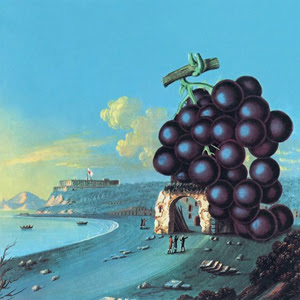Their debut album from 1967 is as close to perfect as rock and roll records get. Thirteen tracks, every one a winner, and all but two under three minutes long. A perfect blend of musical styles, great vocals, outstanding three-guitar interplay, and excellent songs. It's really all there. The record sold reasonably well and made it to #24 on the Billboard album charts. But Columbia records decided to promote the record by audaciously releasing five singles from the album on the same day of LP's release. Only Omaha cracked the top 100 because DJs had no idea with what to do with five simultaneous singles. This was 1967, and "hype" was a bad word in the counter culture, so that just made things worse.
As brilliant as they were musically, they were naive and ill-guided in the legal department. Their manager Matthew Katz, who had also managed Jefferson Airplane (they fired him before Moby Grape formed) and It's A Beautiful Day, was a special kind of dick. He ended up owning the rights to their name as well as to their publishing, and the legal dispute continued for over 30 years until 2006 when Katz at last lost in court, but only after destroying any chance the band had of making some sort of comeback.
Add to that, during the recording of their second LP, Wow/Grape Jam, Skip Spence went nuts when his manic depression was stoked by LSD and hard drugs. He tried to attack his fellow band members, and eventually arrived at the studio with axe in hand, only to be carted off by police. Spence wound up spending six months in Bellevue being treated for psychosis.
Wow 1968 received a lukewarm reception at the time, and while it is certainly indulgent, it has a number of fine tracks. Murder In My Heart For The Judge, Can't Be So Bad, He, Bitter Wind, and Miller's Blues are all solid. The record charted at #20, and the Grape Jam record was included in the package for the price of a single record. Which was certainly appropriate since it was nothing special.
With Skip Spence on extended hiatus due to instability, the other four got back to work and produced
Moby Grape '69, an outstanding record that almost equals their debut. It didn't crack the top 100 on the charts. The buying public had been disappointed by
Wow, and maybe there was limited promotion, but Ooh Mama Ooh, Ain't That A Shame, It's A Beautiful Day Today, Trucking Man, and Spence's Seeing are all good songs performed well. The record has a little more of a country feel than they had previously established, but the rockers rock.
They owed Columbia one more record, and that's why there's
Truly Fine Citizen 1969. Bob Mosley had left to join the marines (!), so Peter Lewis, Don Stevenson, and Jerry Miller recorded this one in Nashville with famous session bassist Bob Moore on bass. The record was recorded in just three days, and while it has some fine moments, mostly from Peter Lewis's pen, it is a disappointing outing at best.

Then in 1971, all five members reunite to record 20 Granite Creek for Reprise. It has a strangely murky sound, but there are a bunch of solid songs in Gypsy Wedding, I'm the Kind of Man That Baby You Can Trust, Going Down To Texas, Road To The Sun, and Ode to the Man at the End of the Bar. It's better than Truly Fine Citizen at least, but the magic of the debut and '69 are missing.
The band would reunite for Moby Grape '84 and again in 1989 for Legendary Grape. I've heard them both, and while they are still a talented bunch, neither record lives up to their reputation. Columbia released a two CD compilation in 1993 titled Vintage: The Very Best of Moby Grape that contains the entire first album, tracks from Wow, '69, and Truly Fine Citizen, plus a number of live, demo, and assorted alternate versions. It has good sound and is worth seeking out.
Based on Wow and '69, the band had at least one more great record to make after the debut. Legal woes with a terrible manager, and bad decisions by Columbia, not to mention psychological troubles for both Spence and Mosley, all add up to a classic could have been, should have been story that seems far too familiar in the annals of rock and roll.












.jpeg)